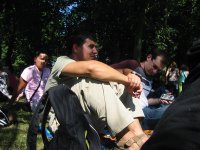






This blog started to cover the culture shock of living abroad, and continues covering the culture shock of settling back home, with entries ranging from everyday (or everynight, most likely) activities to rambling about any subject I might feel like complaining about.




























"V for vendetta": The graphic novel (1982-1985) and film (2005):
The last film produced by the Wachowski brothers is again a piece of work worth of the authors of Matrix (as opposed to the two improvised sequels of such film). It has to be said that much of the merit should undoubtedly go to the graphic novel by Allan Moore in which the film is based. However, the screenplay is a faithful adaptation of the story, and the film is excellently directed. The action occurs without leaving time to wander off. Obviously, there are parts of the graphic novel missing (the film is already over two hours long), but the main aspects of the story are there, although it might sometimes require a bit of extra attention to get some details.
"V for vendetta" was written by Allan Moore after the shift to the right of British opinion that brought to the power the Tories and Margaret Thatcher. In the graphic novel, Moore presents a British society subjugated by a extreme-right-wing government, oppressing and controlling its citizens in the process of 'protecting' them from the disastrous state of chaos that ravages the rest of the world (there are continuous references to the civil war and famine in what had been the US, not to speak of other countries). Television offers the usual share of totalitarian state propaganda and hatred against foreigners, 'deviants', and 'terrorists; there are night curfews, the state-police are free to harass and take advantage of citizens... Until someone dressed like a Shakespeare contemporary and wearing a smiling mask, starts getting the attention of the government and the population by performing daring terrorist attacks. The story shows the progress of the vengeance of such character and his terror campaign to bring down the government, and his attempts to wake up the rest of the citizenship from their sheepish compliance.
Given the appalling outcome of previous attempts to adapt Allan Moore novels into the big screen, I was pleasantly surprised that finally this time the film contains all the grim view from the original novel and not only the fancy characters or the surface story. It is specially refreshing in these times of ultra-mild Hollywood cinema, where the most anti-social activity of villains is to smoke, that the script keeps the original darkness, sometimes pessimism, and specially that it is uninhibited by political correctness conventions. "V" is a hero, but in more ways than one is an evil hero. He pretends to save British society from its apathy in front of a tyrannic government, and any mean is acceptable to gain that end. During the process he also takes revenge on those who wrong-did him and many others in the covert chemical and bacteriological research centers of the government. Quoting from the film "What they did was monstrous, (...) and they created a monster".
The story contains some weak points, specially how a lone man could build single-handedly the infrastructure to perform those daring terror attacks, but that could be taken as a literary licence (this being a story originally addressed to teenagers and young adults), being that the important message is not the 'how', but the 'what' and 'why' and more important still, the 'to what end'. I guess another quote that would summarise the moral of the story comes from close to the end of the film "(...) because behind this mask there's an Idea, and Ideas are bullet-proof".

Yesterday I went to see the last film by Christian Volckman, "Renaissance". I didn't know anything about the film beforehand. Let's say I like sci-fi and animation films, and I was appealed by the poster of the film and the little bit of information you get in the magazine of the cinema where it was shown.
I have to say that I was very impressed by the look and general design of the film. Everything is done in black and white (not just as opposite to *color*, but pure and plain *black and *white*). The image and design of Paris in mid 21st Century is amazing, combining the magic of the city,
with its characteristic architectural style, with a *future-retro* athmosphere mixing structures on the style of the Eiffel tower, and ultra-modern buildings, with some influences from even "Metropolis".
The story itself has a promising beginning, but after a while it becomes rather topical of this genre of films, and although it's still enjoyable to watch it becomes a bit dull and previsible at some points.
In a nutshell, I'd say that it's a film with brilliant image design, (and special effects), but the story it tells, without being bad, could have been much better.

A couple of weeks ago, and in spite of the cold and snowy weather, we decided to go to Chartres (about a 100km south of Paris) and visit one of the greatest gothic-(and Romanesque) cathedrals in France.
The present cathedral was finished in the early 13th century (1223) after a fire had partly destroyed the previous Romanesque one (the south tower and the façade are what remains of thRomanesqueee cathedral). During the Revolution it was decided that such a monument should be not only vandalised, but demolished, but of course, such enterprise had to be carefully planned and a commission was set to see to it. Fortunately, the discussions of the commission took so long that they never managed to finish the demolition plans, and the cathedral survived.
Our visit started by a short walk around the medieval quarters of Chartres, and by checking the schedule of guided tours to the cathedral. As it was freezing, we had almost two hours to the guided tour, and it was about the right time, we decided to go for lunch to one of the 'bistro' recommended in out tourist-guide. What we didn't know was that that precise weekend Chartres was celebrating the anniversary of the crowning of Henry the 4th (the only French King crowned here... the other ones were crowned at Reims), and all restaurants were very busy, serving the same menu (it seems that Henry the 4th was known to like a type of chicken soup). The problem with that was that it took about 3 hours to have the four courses (skipping coffee), so we missed by about 1 hour the guided tour we wanted to take. Anyway, it was fun, and the food was really excellent (I should include the menu on the blog).
Anyway, finally we made it to the cathedral, and we were astonished by it. We were late to take the guided tour to the cathedral, but just in time to the one of its crypt, which contains some of the most interesting aspects of the visit. To start with, the hill where the cathedral stands was considered by the druids to be a site of great power, and it had been used for a long time for their rituals. It is possible to see on the side of thcryptpt a round well with a square bottom, with its wallperfectlyty oriented to the cardinal points, that was used in those times for some rituals. Thcryptpt holds the Sancta Camisia, a tunic that was supposed to belong to the Virgin Mary, brought back from thcrusadeses, and donated to the Cathedral by Charlemagne. In the same chapel of the crypt there is the reproduction (the original was lost in a fire), of the Virgin of the Underworld (named like that in the Spanish and French versions of the brochure of the visit, but not in the English translation), a famous Black Virgin. The term Black Virgin refers to those images of a woman with child, that although nowadays are revered as images of the Virgin, they were possibly images of early goddesses previous to Christian influence.
The crypt itself was the last stage of the pilgrimage to Chartres. Pilgrims entered it by the South Tower (the old one, symbolising the Old Testament), and walked all the circa 130m of the corridor that is the crypt, raising into the main nave of the church, and into the light, by the North Tower, which symbolises the New Testament.
On the floor of the nave of the upper church there's a labyrinth (unfortunately mostly hidden by chairs and benches), which was also a symbolic representation of the pilgrimage to Jerusalem.